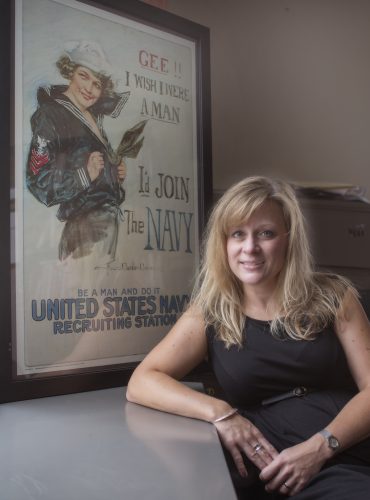The Evolution of Female Military Entertainers
Kara Dixon Vuic unravels the role of “girl next door” entertainers.
The Evolution of Female Military Entertainers
Kara Dixon Vuic unravels the role of “girl next door” entertainers.
For almost two decades, Kara Dixon Vuic has studied the changing roles of American women on the war front.
One book, several articles and scores of presentations later, the Benjamin W. Schmidt Professor of War, Conflict and Society in 20th-Century America said she is still discovering insights into the intersection of women and war.
For her book, The Girls Next Door: Bringing the Home Front to the Front Lines, coming from Harvard University Press, Vuic looks at the evolution of female military entertainers between World War I and the Gulf War.
During World War I, the American public had a romanticized notion about faraway male soldiers, Vuic said, and no desire for women and war to mix.

Kara Dixon Vuic, the Benjamin W. Schmidt Professor of War, Conflict, and Society in 20th-Century America, studies the confluence of war and gender. Photo by Robert W. Hart
The Selective Service Act of 1917, commonly known as the draft, increased the likelihood someone would know a military cadet, the associate professor of history said. “Americans began to fear that they were going to send their ‘boys’ to France, where they would get drunk and visit prostitutes.”
To alleviate the concerns of parents and boost morale during World War II, organizations such as the Young Men’s Christian Association and Salvation Army formed the United Service Organizations and sent young American women to keep soldiers entertained.
“Their purpose was to make these men comfortable, make these men smile, take their mind off war for a while. But they were also young, wearing a little dress. They were supposed to be the girl next door,” Vuic said of USO entertainers in the early 20th century, who included singers, dancers and women in recreational roles such as board game companions.
“Military entertainment was not just fluff. It’s not just, ‘Let’s do something to give them a good time.’ From the organization’s and military’s perspective, this really matters. They’re expending a lot of resources to make sure American soldiers have contact with American women,” she said.
During the Vietnam War, female military entertainers were aware of social movements back home, including second-wave feminism and the anti-war movement. If the women opposed the war, Vuic said, they had to navigate their consciences and their civic duties.
“They try to say: At least I made someone’s day better. At least I can go and say, ‘These guys had a horrible experience … and I helped,’ ” Vuic said. “Everyone tries to figure out [their roles] through the essential human connection, the base of it all.”
By the end of the 20th century, women accounted for nearly 15 percent of active-duty forces, according to the Department of Veterans Affairs.
“As women join men in combat, [Vuic] is one of the few scholars poised to help us understand this striking transformation in the modern world,” said historian Michael Edward McGerr, the Paul V. McNutt Professor of American History Since 1865 at Indiana University.
Opening more roles for women in the military challenged the traditional approach to wartime entertainment. Women were in the audience, yet the entertainers were highly sexualized females.
“Sexuality is written all over the face of it,” Vuic said. “We’ve always had sexuality as part of the program. These girls are supposed to represent home, good girls. They represent a sexuality that was acceptable. But now you’ve got women in the audience.”
Vuic’s research into how the female presence is changing the war front is necessitating new perspectives on the masculine stereotype of the U.S. military. Part of the reframing might require less-sexualized forms of entertainment, Vuic said, because the status quo “offers these two contradictory views of women.”

Your comments are welcome
1 Comment
With women in the military the USO should be sensitive to women in the audience. I am aware that other entertainers include Country singers and groups and Rock groups. There is all type of entertainment available to the service people as a break from their duties and fun for them .
Related reading:
Features
Katherine Spillar Fights for Feminism
Activist helps lead the charge for gender equality.
Alumni, Web Extras
TCU Magazine Podcast: Katherine Spillar and Carmen Rios
Ms. magazine put sexual harassment on its cover in 1977 and now the executive editor lends a hand to the #MeToo and Time’s Up movements.
Features
‘Come From Away’ Inspiration Beverley Bass Tells Her Story
An American Airlines pilot got diverted on 9/11, and her story has landed on Broadway.